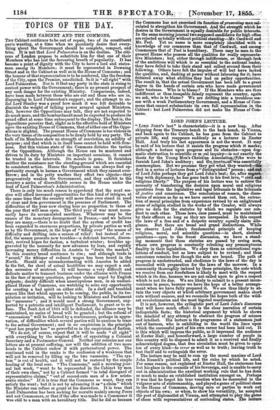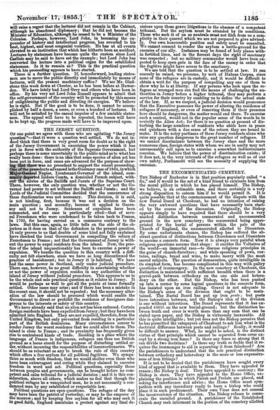LORD JOHN'S LECTURE.
"Loan Tomes last" is characteristic—it is a new leap. After skipping from the Treasury-bench to the back bench, to Vienna, and back again to the Cabinet, he has gone from the Cabinet to private life, and reappears suddenly as a lecturer in Exeter Ran. And truly his last appearance is not the worst. It may be said of his lecture that it assists the progress which it marks; although a lecture ukon progress and its obstacles—upon 'dog- matic obstruction to scientific or m inquiry—is not exactly the thesis for the Young Men's Christ* Assomati -'1,rho were to furnish Lord John's auditory; and Cs-o t (Was essentially commonplace. But we presume they got what they wanted—the first in a series of lectures from a " distinguished" person • and out of Lord john perhaps they got Lord John's best; for, after coquet- ting with diplomacy, he has gone back to his first love, " civil and religious liberty." The purpose of his lecture was to enforce the necessity of transferring the decision upon moral and religious questions from the legislative and legal tribunals to the tribunals of justice and conscience. The conclusions of reason,- the-disco- veries of science as far as we have carried them out, the extrac- tion of moral principles from experience revised by en enlightened sense of religion studied in the works of the Creator, will- always give us data for the statutes by which we regulate our con- duct to each other. Those laws, once passed, must be maintained by their officers so long as they are unrepealed. In this respect the laws of a free and of a despotic country equally claim alle- giance. But there are broad and grand distinctions. While we observe Lord John's fundamental principle of keeping religious, moral, and scientific questions—in short, abstract questions—open to the freest discussion, we have a stand- ing memento that these statutes are passed by erring men, whose own progress is constantly rebuking any presumptuous finality in their legislation. We obey them as conventional regu- lations of conduct, but as laws subject to be revised ; and thus conscience remains free though the acts are bound. The path of progress is unobstructed, and obedience to the laws of the day is reconciled with preparation for the laws of the morrow. In a community thoroughly imbued by these principles, the code which we receive from our forefathers is likely to meet with the respect which is its due, because we are not called upon to give a respect which is not its due. We are likely to submit to a present incon- venience in peace, because we have the hope of a better arrange- ment when we have fully prepared it. We are thus likely to at- tain the very objects at which arbitrary government makes short cuts without success, and we reconcile the hopes both of the wild- est revolutionaries and the most bigoted reactionaries.
It is not, however, the syllogistic part of Lord John's discourse that will have much effect : it is the clear narration of certain indisputable foots; the historical argument by which he shows the mischief of any attempt to obstruct the progress of science and intellect. His lecture is the programme of a statesman just out of harness, who is exhibiting to the world the lines upon which the successful part of his own career had been laid out. It is this which will impress the public, as it impressed the audience at Exeter Hall; and henceforward, a large number of people in this country will be disposed to admit it as a received and finally acknowledged dogma, that free circulation must be given to opin- ion of every kind—to error as well as to truth; leaving truth to test itself and to extinguish the error. The lecture may be said to sum up the moral Mail= of Lord john Russell's political life, and the rules by which he acted. For some reason, not explained at Exeter Hal b the statesman has lost his place in the councils of his Sovereign, and is unable to carry out in administration the excellent working rule that he has done so much to make an established institution amongst us. Per it was that he forgot his true vocation when he descended to vagarer arts of statesmanship, and played a game of political chess in the House of Commons, moving men or parties to work out objects of his own; or when, to show his versatility, he accepted the post of diplomatist at -Vienna, and attempted to play the game of chess with representatives of contending states. The lecture will raise a regret that the lecturer did not remain in the Cabinet, although he abandoned diplomacy; that he did not become the Minister of Education, although he ceased to be a Minister of the Colonies. Perhaps, however, Lord John, in becoming the ex- pounder of history and intellectual progress, has reverted to his best, highest, and most congenial vocation. He has at all events elevated to an institution that which has hitherto been an accident. Lectures by statesmen have become quite the custom since Lord Carlisle may be said to have set the example ; bat Lord John has converted the lecture into a political organ for the established statesman. Is it to remain so ? This is the practical question which his proceeding appears to have started.
There is a further question. If, henceforward, leading states- men are to move the public directly and immediately by means of lectures, will the present machinery suffice ? We see Mr. Glad- stone this week down at Chester, as he has been before at Hewer- den. We have lately had Lord Grey and others who have been in office. By his very act Lord John Russell appears to admit that the self-government of the country will be promoted by this means of enlightening the public and directing its energies. We believe he is right. But if the good is to be done, it cannot be accom- plished by half a dozen, a score, or even a hundred of lectures. It will not be satisfied by the casual impulse of a few amiable states- men. The appeal will have to be repeated, the lesson will have to be kept up, the progress made will have to be improved upon.



































 Previous page
Previous page